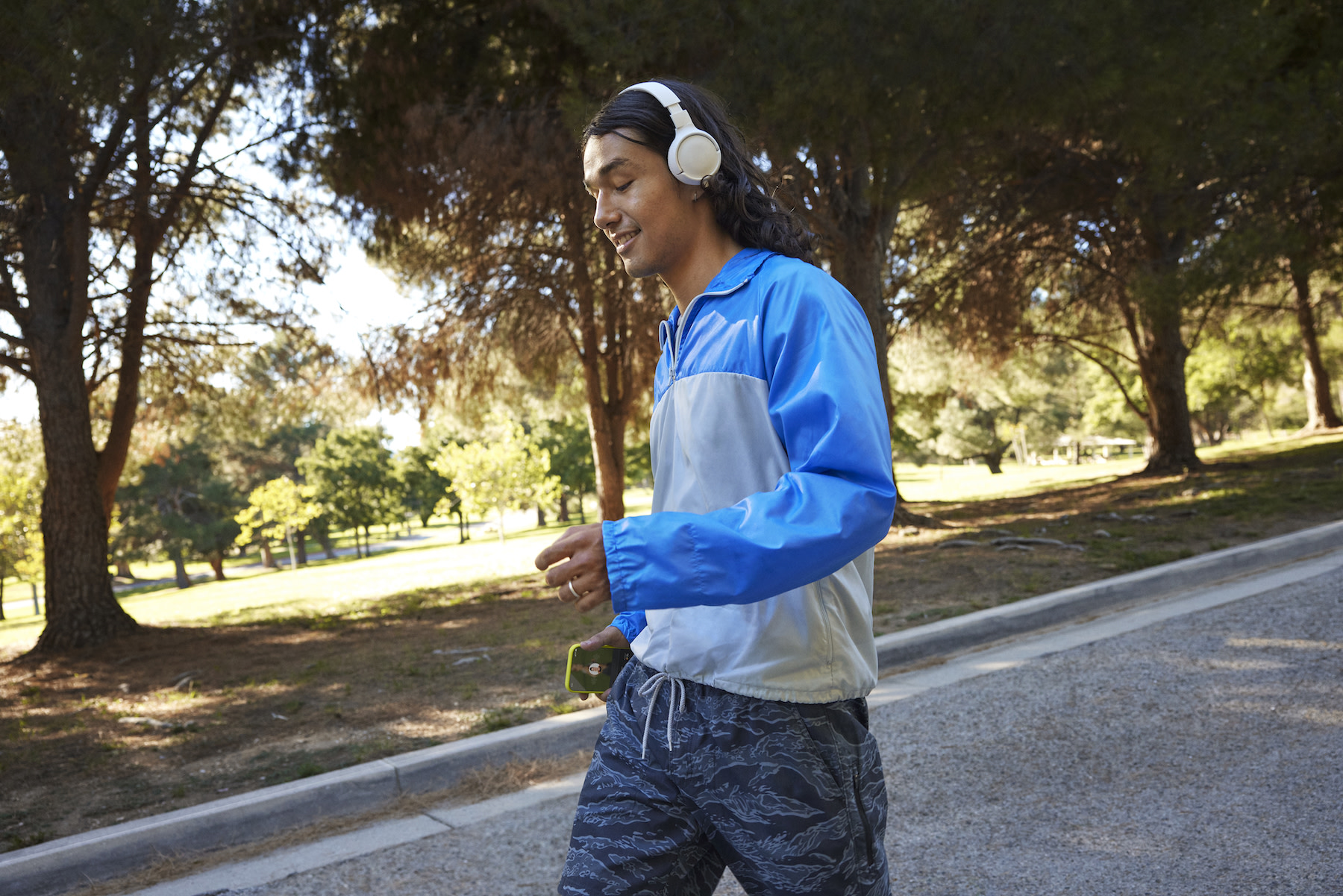
Why Exercise Is So Powerful at Reducing Stress, According to Science
Working out is a reliable way to feel more calm.
By Ayren Jackson-Cannady•
How Does Exercise Reduce Stress?
How Much Exercise Do You Need to Relieve Stress?
What Types of Exercise Reduce Stress?
How Can Unaddressed Chronic Stress Affect Your Health?
The Takeaway
Many of us are no strangers to stress. Year-end work review coming up? Hey girl, hey! Baby won’t sleep? Fancy seeing you here! Broken boiler? Hello, old friend! According to a 2023 survey conducted by the American Psychological Association, nearly one in four adults rated their stress between an eight and 10 (on a scale of one to 10), with 10 symbolizing a great deal of stress.
Discover more ways to reach your goals with Peloton
At that rate, you might be feeling stressed this very minute. And for the most part, stress is (unsurprisingly) not good for us. Researchers have linked chronic stress to a range of physical health problems, including cardiovascular issues, digestive concerns, and a weakened immune system.
But there is good news: Exercise is an easily accessible, endlessly customizable way to offset stress. According to research published in the Journal of Clinical Psychiatry, exercise improves mental health by boosting self-esteem and cognition and by decreasing anxiety, depression, and bad moods. But exactly how does exercise reduce stress, and how much movement do you need to feel the benefits? Let’s take a closer look.
How Does Exercise Reduce Stress?
Exercise offsets the negative effects of stress by providing your body with countless positive results instead. Specifically, here are a few key ways exercise relieves stress, according to Carrie Howard, a licensed therapist and anxiety coach in Gunter, Texas, and Meredith Van Ness, a licensed therapist in Steamboat Springs, Colorado.
1. Increased Wellbeing
Exercise stimulates the release of endorphins ("feel-good" hormones) that act as natural painkillers and mood elevators, counteracting the effects of stress hormones.
2. Better Sleep
Working out promotes better sleep quality, and when your body gets enough rest, you’re less likely to feel stressed. Research published in 2021 in Preventing Chronic Disease, for instance, concluded that inadequate sleep is associated with a higher risk of frequent mental distress.
3. Hormonal Regulation
Physical activity helps balance hormones in the body. It can enhance the sensitivity of hormonal receptors, making the body more efficient in responding to stress signals.
4. Relaxed Muscles
Stress often manifests as muscle tension. Exercise—particularly activities like stretching and yoga—can help alleviate muscle tightness and promote relaxation.
5. Improved Mental Clarity
Beyond the immediate benefits of working out (like a happier mood or more energy), exercise also gives your mind a place to untangle itself from the chaos of everyday life, Van Ness says. “Psychologically, it offers a dedicated space for processing thoughts, clearing mental clutter, and regaining focus,” she explains. “Emotionally, it becomes a constructive outlet, allowing the rhythmic cadence of each step, pedal, or stretch to channel stress into a positive and transformative force.”
How Much Exercise Do You Need to Relieve Stress?
There’s no magic workout length you need to squeeze in for stress relief. The Department of Health and Human Services recommends at least 150 minutes of moderate exercise per week, which is a solid benchmark to follow. But for stress relief purposes, you should find what works for you. What resonates with your body and lifestyle might not resonate with someone else’s.
“Optimal stress reduction is about consistent, sustainable habits rather than rigid adherence to a specific number,” Van Ness says. “It's the daily commitment to moving your body in a way that feels good, acknowledging that some days might call for a brisk walk while others demand a longer, more intense workout.”
Howard recommends exercising during times of high anxiety or stress and using it daily in a preventative manner. So, whether you’ve done part of your 150 minutes for the week or not, if you’re feeling those anxious feelings come up, get moving. “Even if you can only get outside for a 10-minute walk each day, you’ll still see many benefits of exercising in short spurts as well,” Howard says.

What Types of Exercise Reduce Stress?
The best part about exercising for stress relief is that there’s plenty of room for customization. You can—and should—exercise in a way that feels best to you.
“It’s not about sticking to a specific regimen; instead, the best exercise is the one that speaks to your soul,” Van Ness says. “Whether it’s the grounding flow of yoga or the cathartic release of a run, magic happens when you genuinely love what you do.”
So, experiment with different types of workouts and routines to see how each makes you feel—and which modalities help melt away stress the most. That said, if you’d like some inspiration for where to start, here are a few stress-relieving exercises to consider:
Aerobic Exercise
Exercises like running, walking, cycling, and swimming have been shown to bump up the production of endorphins. They also improve cardiovascular health and boost overall energy levels.
Yoga
“Yoga is phenomenal when it comes to stress reduction, as it incorporates moving the body, stretching, breathwork, and meditation, often simultaneously,” Howard says.
There’s some research to back this up. A 2021 Journal of Occupational Health review and analysis found that yoga was especially effective in reducing occupational stress in healthcare workers. And a 2023 randomized control trial in the Journal of Behavioral Medicine found that remote yoga classes decreased stress and improved working memory among participants.
Pilates
With a focus on core strength, flexibility, and control, Pilates has been shown to reduce stress, promote mental clarity, improve cardiovascular function, and more. This low-impact workout also promotes a mind-body connection, meaning it’s a good workout for your brain and muscles alike.
Tai Chi
It’s all about breath and slow, flowing movements with tai chi. This mind-body practice, which originated as an ancient martial art in China, has been shown to reduce stress. Breathwork, a core part of tai chi, can prompt a state of relaxation, leading to a decrease in heart rate and an activation of the vagus nerve, which is responsible for the body’s “rest and digest” functions.
Resistance Training
Weightlifting and resistance band exercises can help you build strength while improving your mood and boosting your self-esteem. And the benefits continue after your sweat session is over. Researchers found that engaging in a single session of resistance exercise at an intensity of 45 percent of your max lifting capacity led to a reduction in anxious feelings that persisted for up to two hours after exercise.
Dance
Dancing is not only a great cardiovascular workout, but also a fun way to express yourself and release tension. Research suggests that dance helps reduce stress and boost serotonin. Meanwhile, in a 2021 study published in Complementary Therapies in Clinical Practice, a majority of survey participants said that conscious dance helped them cope with a stress-related health condition, such as anxiety or chronic pain.
Outdoor Exercise
Being in nature and engaging in physical activity simultaneously provides a double benefit for stress reduction. One 2023 study published in the journal Nature, for example, found that taking a brief walk outside resulted in greater cognitive function than walking inside. Another 2022 meta-analysis published in Applied Psychology: Health and Well-Being suggests that physical activity in nature may be more beneficial for your mental health than workouts in urban environments. Whether it’s a walk, hike, run, bike ride, you name it—exercise in the great outdoors may help relieve stress.
No matter which kind of exercise you choose, Van Ness recommends checking in with yourself before, during, and after your workout. “Our brains require constant reminders and validation that exercise as a stress management tool is indeed effective,” she says. “This self-observation becomes a powerful reinforcement, solidifying the understanding that exercise is not just a physical activity but a dynamic tool for mental and emotional wellbeing.”
Related Articles

Meditation
Meditation Is an Easy and Effective Stress Reliever. Here Are 7 Tips for Getting Started

Mental Health
22 Common Signs You May Be Mentally Exhausted—and 7 Expert Tips for Finding Relief

Sleep
Having a Consistent Sleep Schedule Reduces Stress. Here’s How, According to Experts

Sculpt
6 Ways Somatic Movement Can Benefit Your Mind and Body
How Can Unaddressed Chronic Stress Affect Your Health?
Real talk: We’re humans, living in an uncertain world, so stress is unavoidable. But it’s the repetition and accumulation of these stress red flags that can lead to bigger, more serious health issues. “When our nervous system stays in a stressed-out, dysregulated state, we open ourselves up to experience a variety of health problems, from digestive troubles to heart disease,” Howard says.
The stress response, commonly known as the “fight or flight” response, happens when your body, under pressure, releases hormones such as cortisol and adrenaline. These hormones prepare you to respond to a perceived threat by increasing heart rate, redirecting blood flow to essential organs, and sharpening the senses.
During acute stress, these changes are adaptive and can boost physical performance. (This is the good kind of short-term stress that protects you when you need it.) However, it’s chronic stress, in which the stress response is frequently activated without adequate recovery time, that hampers our health. As the Mayo Clinic explains, it’s when your body feels like it’s constantly under attack, perceiving stressful everyday tasks like paying bills as threats.
“When you’re in a prolonged stressed state, your body is constantly producing high levels of cortisol and adrenaline,” Howard says. That puts you at risk of health problems. For example, elevated cortisol levels can impair your immunity, mess with your digestion, increase appetite, and break down muscle fibers. Meanwhile, excess adrenaline can increase heart rate, elevate blood pressure, and trigger an unwanted blood sugar boost.
Common Stress Symptoms
Stress looks different for everyone. It often shows up in subtle ways, revealing itself through several nuanced signals that might go unnoticed amidst the busyness of everyday life—but that can impact your mental and physical wellbeing.
Common stress signals to watch for include (but aren’t limited to):
Physical symptoms: Persistent fatigue, weakened immune system, recurrent headaches, chest and stomach pain, digestive issues, muscle tension
Emotional symptoms: Anxiety, depression, sadness, restlessness, mood swings
Behavioral symptoms: Substance abuse, overeating, nail-biting, pacing, unhealthy coping mechanisms (e.g. gambling)
“Understanding and acknowledging these symptoms are crucial initial steps toward effective stress management,” Van Ness says. “By tuning in to the signals our bodies and minds send us, we can catch the early signs of stress and proactively address them to safeguard our wellbeing.”
The Takeaway
In a world where stress is an everyday companion, the consequences of chronic stress on health are substantial. Linked to cardiovascular problems, digestive issues, and a compromised immune system, chronic stress can lead to serious health concerns. However, there's a silver lining: Exercise can relieve stress and improve mental health by reducing anxiety, depression, and negative mood.
The physiological explanation lies in the release of endorphins, better sleep quality, hormonal regulation, and relaxed muscles achieved through physical activity. While the recommended 150 minutes of exercise per week is a solid guideline to follow, prioritize finding a routine that suits individual preferences and lifestyles. Exercising during times of stress or anxiety, even in short bursts, proves effective in mitigating these feelings. Stress relief through exercise is customizable, with options like aerobic exercise, yoga, Pilates, tai chi, resistance training, dance, and more.

Peloton App
Access thousands of classes with no equipment needed.
This content is for informational and educational purposes only and does not constitute individualized advice. It is not intended to replace professional medical evaluation, diagnosis, or treatment. Seek the advice of your physician for questions you may have regarding your health or a medical condition. If you are having a medical emergency, call your physician or 911 immediately.
Strengthen your mind-body connection
Enter your email to get articles, expert-backed tips, and updates from Peloton sent to your inbox.
By providing your email address, you agree to receive marketing communications from Peloton.
For more about how we use your information, see our Privacy Policy.









